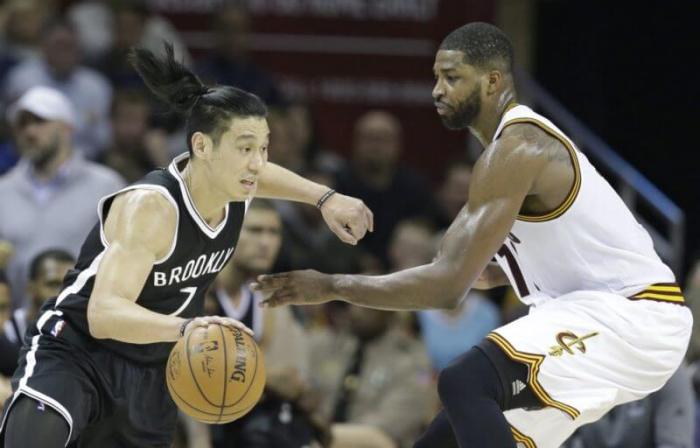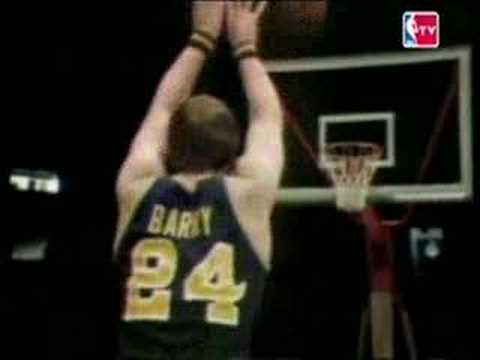There’s a reason why the Nets have long been considered one of the NBA’s most woe-begotten, dysfunctional franchises. And while I would be more comfortable if this nothing-will-ever-go-right stigma was really just a byproduct of Nets’ fans imaginations, it’s seasons like 1994-95 that emblemize all that is really wrong with this organization.
Coming off the heels of a moderately successful 1993-94 season, which saw the organization, despite the tragic loss of Drazen Petrovic, make the playoffs again and take a game from the eventual Eastern Conference champion Knicks, the Nets were dealt another loss, this time with the “retirement” of coach Chuck Daly. While Daly never came close to the success he had in Detroit in New Jersey, he was unquestionably the steady hand that kept this group of young malcontents from driving straight over a cliff – which is exactly what happened under Daly’s replacement, Butch Beard.
Who was Butch Beard? I remember my brother breaking the news to me that the Nets found their replacement for Daly – why not Paul Silas, who was in the mix? Instead, we got a guy whose name sounded a lot like a product placement for a team sponsor (ice cold, refreshing Butch Beard). The Nets went from having one of the greatest coaches of the 1980s to a first-timer, who needed to manage the talented but combustible duo of Derrick Coleman and Kenny Anderson, not to mention some other noted attitude problems in Chris Morris and Benoit Benjamin. Needless to say, Beard was in over his head, and with the lunatics running the asylum, things turned pretty sour for the organization very quickly.
The team finished 30-52, 5th in the Atlantic Division and out of the playoffs, but their performance on the court is essentially immaterial compared to what these guys accomplished off the court. The 94-95 season reads like a greatest hits list of Nets infamy. There was Morris, a former 4th overall pick in the draft, who was a flashy dunker, but an inadequate offensive player otherwise (think Richard Jefferson as a rookie, with no drive to get better). Unsatisfied with his decreasing playing time and with the fact that Beard had asked him to tie his shoelaces before getting on the court, Morris wrote “trade me” on the back of his sneakers during a game. Unfortunately, when a player so openly campaigns to leave, it hurts his trade value, and the Nets kept Mo and his petulance for the remainder of the season, where he averaged a then career-low of 27 minutes and 10.9 points per game.
Then there was Anderson, who after getting benched in a late December game against the Knicks, no-showed the next practice because of “car trouble,” the classic “dog ate my homework” excuse. After being called out for it, he called it “water under the bridge” even though Beard never indicated that all was forgiven. He was constantly struggling with injuries, and fighting with his teammates over ball distribution, most notably, second-year second-stringer Rex Walters, who when asked to grade all of his teammates by the beat writers gave a “no comment” despite giving everyone else “A’s” and “B’s.”
Which brings us to Coleman, who really made a name for himself and the organization in all the wrong ways. Beard was constantly berating Coleman for not showing any kind of leadership. When the coach instituted a dress code that required shirts and ties as players traveled, Coleman responded smugly with a blank check to Beard for all the fines he would inevitably rack up. When he was questioned about Anderson’s no-show at practice, Coleman responded with his now famous “whoop de damn doo.”
By January 1995, Coleman became the poster child for all that was wrong with the NBA and its whiny, petulant culture in the post-Jordan era. His crybaby mug was splashed on the front page of Sports Illustrated and his antics were featured prominently in the accompanying article. Just a year after being voted as a starter in his first all-star game, Coleman was generating national attention again, this time for being a jerk.
And just to bring race into the mix, Coleman, who was a frequent target of Jazz PF Karl Malone who considered DC to be lazy, called the Jazz superstar an “Uncle Tom.”
The following season, Morris was in Utah, Anderson was traded to Charlotte (Hornets) and Coleman was in Philadelphia. The return on those trades is a topic for another Nets Yearbook, but it should be noted that the nail in the early 90s Nets coffin was driven in during the 94-95 season. By the time these key players were gone, the forest had long been set ablaze, leaving very little behind. As I said earlier, there are certainly plenty of fan bases out there that seem to unnecessarily relish the sadistic side of sports (I’m thinking you (us) Mets fans who are still better off historically than the Cubs and a number of other organizations). But with the Nets, this awful turn of luck has been quite real. Two years before the start of the 94-95 season, the Nets were building around a core of Petrovic, Coleman and Anderson. Instead, Petrovic dies, Daly retires, and the remaining two stars decide that they were better off playing their careers elsewhere, rather than being rising stars and catalysts in the swamps of Jersey.
New Faces:
Chris Childs – A nice little story for the organization during a season of turmoil. Childs originally went undrafted out of college in 1989, and floated from team-to-team in the Continental Basketball Association, a precursor of sorts to the D-League. The Nets brought him in 2004 primarily as a back-up to Kenny Anderson, but he got some spot starts and had a solid season averaging 5.8 points and 4.1 assists on 33 percent three-point shooting. He would later make a name for himself as the main PG on the late 90s Knicks.
Yinka Dare – A friend of mine once called me out for constantly taking potshots at Dare, who passed away way too young. But he truly was one of the most notoriously bad players in franchise history. Perhaps if the organization didn’t go so out of its way to hype this guy (who is he? Yi Jianlian?), I wouldn’t be so bitter about Yinka, who didn’t earn his first NBA assist until his third NBA season. However, it’s worth noting that after shocking many and taking him in the first round the summer before, Yinka appeared in exactly one game with the Nets in 94-95 before injuring himself and ending his season.
Sleepy Floyd – A solid point/combo guard, joined the Nets 12 years after originally being drafted by the team. Floyd was a solid offensive player, averaging 18.8 points and 10.3 assists in 86-87 with the Golden State Warriors. He appeared in 48 games with the 94-95 Nets, his final season.
News and Notables:
- The Nets opened that season against the defending champion Houston Rockets and despite giving up 30 first quarter points, they held the Rockets to 90 overall in a 90-86 loss.
- The team lost at least four games in a row on six different occasions, including one stretch in March-April where the Nets lost 11 of 12 games.
- Due to various “injuries,” Derrick Coleman only played in 56 games this season, though despite being at his behavioral worst, he still managed to produce a PER (Player Efficiency Rating) of 19.0 for the season. In January, he got some laughs when he said in a prepared statement “I want to finish my career with the Nets.”
- A year after appearing in all 82 games, Kevin Edwards, Drazen Petrovic’s replacement at SG, only appeared in 14 games in 94-95 due to various leg injuries.
- The much maligned Nets center Benoit Benjamin, who was hovering near 300 lbs when the season started, had a stretch in December-January where he scored in double digits in seven straight games, including a 30 point, 8 rebound, 4 blocks outburst against the Pacers on January 3.
- Rex Walters, who granted, accomplished very little on the court during his time as a Net, was not shy about calling his teammates out in the media. In the aforementioned SI article, he asked the writer if he was Sigmund Freud, “because this is the craziest group of guys you’re going to find.” Soon afterwards, Walters told beat writers about Kenny Anderson, who had earlier criticized the Kansas product as “one-dimensional,” “If Kenny criticizes me, well, what’s he shooting a grandiose 40 percent?”
- Years before people worried about Francisco Rodriguez’s games finished vesting option, Nets PF Jayson Williams was traded to Jersey from Philadelphia with a provision that if his points and minutes played cumulatively averaged 19 a game, the Nets would have to forfeit a first round draft pick. As a result, Williams’ who was coming into his own as a reserve in 94-95, saw his playing time decrease drastically in the second half of the season. Needless to say, Williams was not happy about it.
- You better believe Butch Beard valued a dress code. He was a spokesman for Perry Ellis menswear during the season, one of 22 NBA coaches who had clothing endorsements in 1994-95.

















